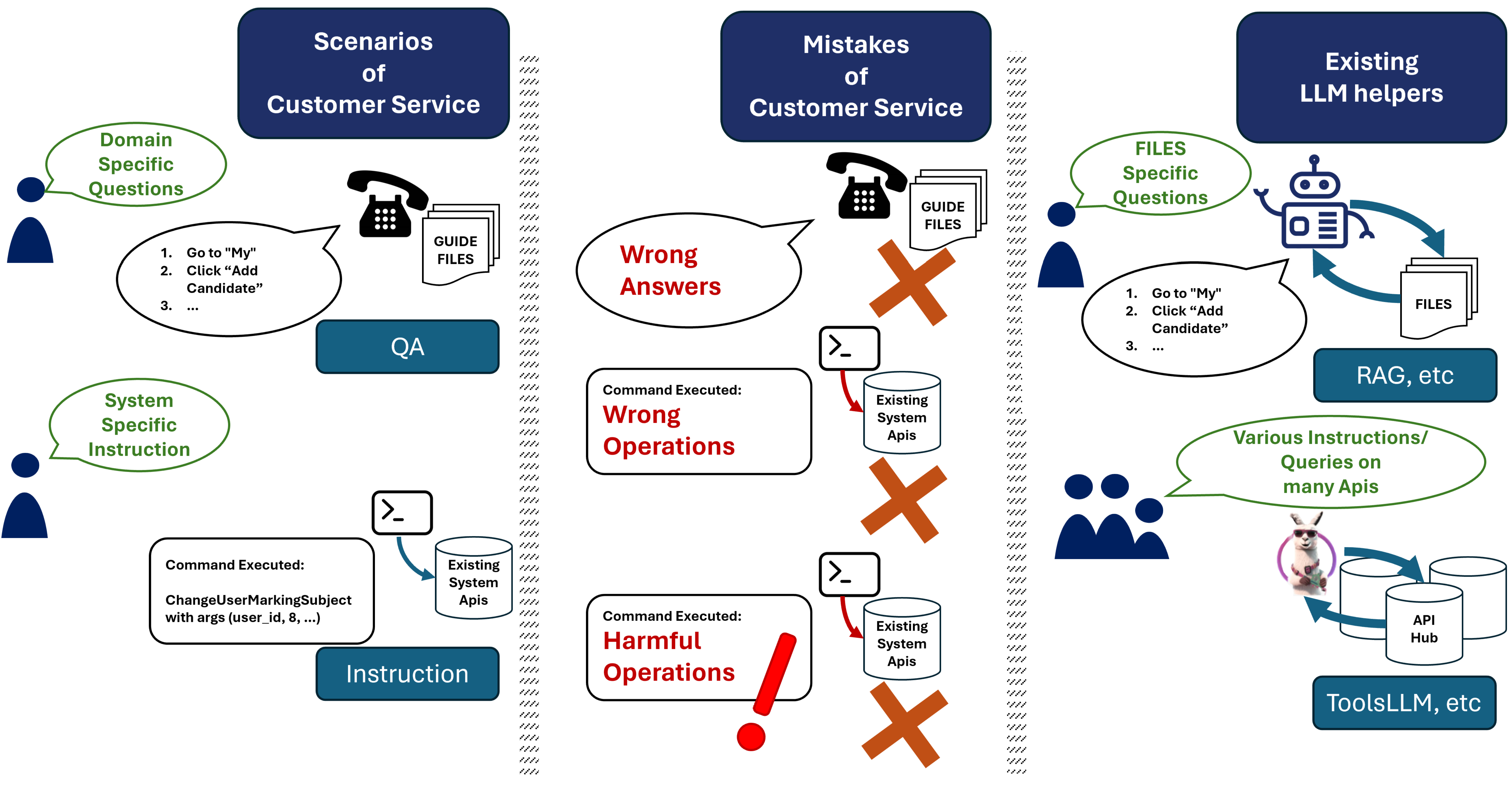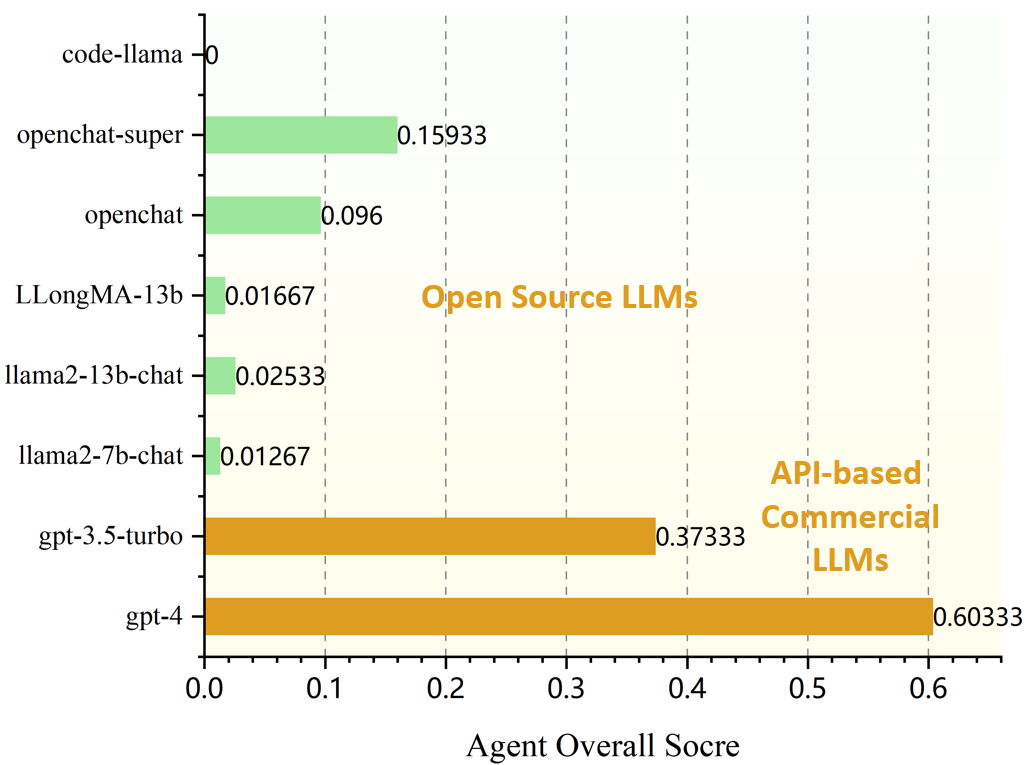CHOPS: CHat with custOmer Profile Systems for Customer Service with LLMs
2404.01343

1
0

Abstract
Businesses and software platforms are increasingly turning to Large Language Models (LLMs) such as GPT-3.5, GPT-4, GLM-3, and LLaMa-2 for chat assistance with file access or as reasoning agents for customer service. However, current LLM-based customer service models have limited integration with customer profiles and lack the operational capabilities necessary for effective service. Moreover, existing API integrations emphasize diversity over the precision and error avoidance essential in real-world customer service scenarios. To address these issues, we propose an LLM agent named CHOPS (CHat with custOmer Profile in existing System), designed to: (1) efficiently utilize existing databases or systems for accessing user information or interacting with these systems following existing guidelines; (2) provide accurate and reasonable responses or carry out required operations in the system while avoiding harmful operations; and (3) leverage a combination of small and large LLMs to achieve satisfying performance at a reasonable inference cost. We introduce a practical dataset, the CPHOS-dataset, which includes a database, guiding files, and QA pairs collected from CPHOS, an online platform that facilitates the organization of simulated Physics Olympiads for high school teachers and students. We have conducted extensive experiments to validate the performance of our proposed CHOPS architecture using the CPHOS-dataset, with the aim of demonstrating how LLMs can enhance or serve as alternatives to human customer service. Code for our proposed architecture and dataset can be found at {https://github.com/JingzheShi/CHOPS}.
Get summaries of the top AI research delivered straight to your inbox:
Overview
- This paper proposes a new system called CHOPS (CHat with custOmer Profile Systems) that uses large language models (LLMs) to improve customer service interactions.
- The system aims to leverage customer profile information to provide more personalized and contextual responses during customer service conversations.
- The authors evaluate CHOPS in a real-world customer service setting and compare its performance to other approaches.
Plain English Explanation
The paper describes a new customer service system that uses advanced language AI, called large language models (LLMs), to have more natural and helpful conversations with customers. The key idea is to combine these powerful language models with information about the customer's past interactions and details about their account. This allows the system to provide responses that are tailored to each individual customer, rather than giving generic, one-size-fits-all answers.
Imagine you're contacting a company's customer support, and instead of getting a generic response, the agent or chatbot seems to really understand your specific situation and needs. That's the goal of this CHOPS system - to make the customer service experience much more personalized and effective by bringing in relevant information about you as the customer. The authors test this approach in real-world trials and compare it to other customer service methods to see how well it performs.
Technical Explanation
The core of the CHOPS system is the integration of LLMs, which can engage in open-ended conversations, with customer profile data stored in a database. When a customer initiates a chat, the system retrieves their relevant profile information, such as their purchase history, account details, and previous interactions. This context is then used to condition the LLM's responses, allowing it to tailor the conversation to the individual customer.
The authors evaluate CHOPS by deploying it in a real customer service setting and comparing it to other approaches, including a rule-based chatbot and a standard LLM without access to customer profiles. They measure outcomes such as customer satisfaction, task completion rates, and efficiency. The results indicate that CHOPS outperforms the other methods, suggesting that the integration of LLMs and customer profile data can indeed lead to more effective and personalized customer service.
Critical Analysis
The paper provides a compelling proof-of-concept for the CHOPS approach, but it also acknowledges some limitations. For example, the evaluation was conducted in a relatively constrained domain (a specific company's customer service), and the generalizability to other industries or use cases is not fully explored.
Additionally, the paper does not delve into potential privacy or ethical concerns that may arise from using customer profile data in this manner. There could be risks around data privacy, algorithmic bias, or the potential for these systems to be used in manipulative ways. Further research and careful consideration of these issues would be important before widespread deployment.
Overall, the CHOPS system represents an interesting and potentially valuable application of LLMs in customer service. However, the authors appropriately recognize that more work is needed to fully understand the implications and ensure the responsible development of such systems.
Conclusion
This paper introduces CHOPS, a novel customer service system that combines large language models with customer profile information to enable more personalized and effective interactions. The results of the real-world evaluation are promising, suggesting that this approach can lead to improved customer satisfaction and task completion compared to other methods.
While the CHOPS system shows significant potential, the authors also highlight important considerations around privacy, ethics, and the need for further research to fully understand the implications of integrating advanced language AI with customer data. As the use of LLMs continues to expand, striking the right balance between technological innovation and responsible development will be crucial.
This summary was produced with help from an AI and may contain inaccuracies - check out the links to read the original source documents!
Related Papers

Enhancing the General Agent Capabilities of Low-Parameter LLMs through Tuning and Multi-Branch Reasoning
Qinhao Zhou, Zihan Zhang, Xiang Xiang, Ke Wang, Yuchuan Wu, Yongbin Li

0
0
Open-source pre-trained Large Language Models (LLMs) exhibit strong language understanding and generation capabilities, making them highly successful in a variety of tasks. However, when used as agents for dealing with complex problems in the real world, their performance is far inferior to large commercial models such as ChatGPT and GPT-4. As intelligent agents, LLMs need to have the capabilities of task planning, long-term memory, and the ability to leverage external tools to achieve satisfactory performance. Various methods have been proposed to enhance the agent capabilities of LLMs. On the one hand, methods involve constructing agent-specific data and fine-tuning the models. On the other hand, some methods focus on designing prompts that effectively activate the reasoning abilities of the LLMs. We explore both strategies on the 7B and 13B models. We propose a comprehensive method for constructing agent-specific data using GPT-4. Through supervised fine-tuning with constructed data, we find that for these models with a relatively small number of parameters, supervised fine-tuning can significantly reduce hallucination outputs and formatting errors in agent tasks. Furthermore, techniques such as multi-path reasoning and task decomposition can effectively decrease problem complexity and enhance the performance of LLMs as agents. We evaluate our method on five agent tasks of AgentBench and achieve satisfactory results.
4/1/2024
📉
Doing Personal LAPS: LLM-Augmented Dialogue Construction for Personalized Multi-Session Conversational Search
Hideaki Joko, Shubham Chatterjee, Andrew Ramsay, Arjen P. de Vries, Jeff Dalton, Faegheh Hasibi

0
0
The future of conversational agents will provide users with personalized information responses. However, a significant challenge in developing models is the lack of large-scale dialogue datasets that span multiple sessions and reflect real-world user preferences. Previous approaches rely on experts in a wizard-of-oz setup that is difficult to scale, particularly for personalized tasks. Our method, LAPS, addresses this by using large language models (LLMs) to guide a single human worker in generating personalized dialogues. This method has proven to speed up the creation process and improve quality. LAPS can collect large-scale, human-written, multi-session, and multi-domain conversations, including extracting user preferences. When compared to existing datasets, LAPS-produced conversations are as natural and diverse as expert-created ones, which stays in contrast with fully synthetic methods. The collected dataset is suited to train preference extraction and personalized response generation. Our results show that responses generated explicitly using extracted preferences better match user's actual preferences, highlighting the value of using extracted preferences over simple dialogue history. Overall, LAPS introduces a new method to leverage LLMs to create realistic personalized conversational data more efficiently and effectively than previous methods.
5/7/2024

Apollonion: Profile-centric Dialog Agent
Shangyu Chen, Zibo Zhao, Yuanyuan Zhao, Xiang Li

0
0
The emergence of Large Language Models (LLMs) has innovated the development of dialog agents. Specially, a well-trained LLM, as a central process unit, is capable of providing fluent and reasonable response for user's request. Besides, auxiliary tools such as external knowledge retrieval, personalized character for vivid response, short/long-term memory for ultra long context management are developed, completing the usage experience for LLM-based dialog agents. However, the above-mentioned techniques does not solve the issue of textbf{personalization from user perspective}: agents response in a same fashion to different users, without consideration of their features, such as habits, interests and past experience. In another words, current implementation of dialog agents fail in ``knowing the user''. The capacity of well-description and representation of user is under development. In this work, we proposed a framework for dialog agent to incorporate user profiling (initialization, update): user's query and response is analyzed and organized into a structural user profile, which is latter served to provide personal and more precise response. Besides, we proposed a series of evaluation protocols for personalization: to what extend the response is personal to the different users. The framework is named as method{}, inspired by inscription of ``Know Yourself'' in the temple of Apollo (also known as method{}) in Ancient Greek. Few works have been conducted on incorporating personalization into LLM, method{} is a pioneer work on guiding LLM's response to meet individuation via the application of dialog agents, with a set of evaluation methods for measurement in personalization.
4/16/2024
💬
Automating Customer Needs Analysis: A Comparative Study of Large Language Models in the Travel Industry
Simone Barandoni, Filippo Chiarello, Lorenzo Cascone, Emiliano Marrale, Salvatore Puccio

0
0
In the rapidly evolving landscape of Natural Language Processing (NLP), Large Language Models (LLMs) have emerged as powerful tools for many tasks, such as extracting valuable insights from vast amounts of textual data. In this study, we conduct a comparative analysis of LLMs for the extraction of travel customer needs from TripAdvisor posts. Leveraging a diverse range of models, including both open-source and proprietary ones such as GPT-4 and Gemini, we aim to elucidate their strengths and weaknesses in this specialized domain. Through an evaluation process involving metrics such as BERTScore, ROUGE, and BLEU, we assess the performance of each model in accurately identifying and summarizing customer needs. Our findings highlight the efficacy of opensource LLMs, particularly Mistral 7B, in achieving comparable performance to larger closed models while offering affordability and customization benefits. Additionally, we underscore the importance of considering factors such as model size, resource requirements, and performance metrics when selecting the most suitable LLM for customer needs analysis tasks. Overall, this study contributes valuable insights for businesses seeking to leverage advanced NLP techniques to enhance customer experience and drive operational efficiency in the travel industry.
4/30/2024